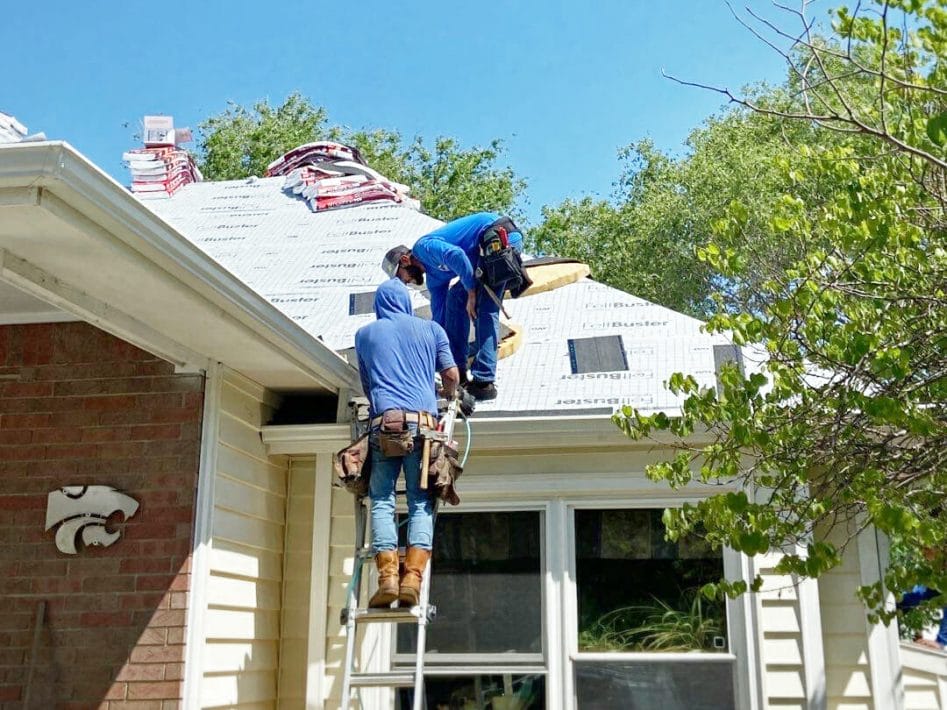The short answer is “no,” waiving a deductible is insurance fraud. The purpose of homeowners insurance deductibles is to give property owners “skin in the game” and discourage excess or fraudulent insurance claims.
Insurance companies underwrite claim amounts based on actual material and labor costs, actual historic claim costs, and details about the specific property. This means that claim amounts reflect the actual cost of putting on a roof.
In the past, contractors “waiving” and advertising waiving deductibles was more common practice, so this is something we get asked about, especially if the customer last had to replace a roof 30 years ago and remembers that back then, the contractor “waived” the deductible.

Two people working on a replacement roof in Kansas
What makes waiving deductibles illegal?
For a contractor to “waive” a deductible, it means one of two things is happening.
Insurance fraud
Creating two different invoices. In this scenario, the company provides a “real” invoice reflecting the actual cost of the job, and a second “fake” invoice to send the insurance company at the job cost amount plus the amount of the deductible. Misrepresenting the cost of the job is insurance fraud, which is illegal federally.
Waiver in exchange
In this scenario, the contractor “pays” the customer the amount of the deductible in exchange for a vague “service” rendered after the actual roofing job is complete. This could be an “advertising” service in exchange for the customer leaving a 5-star review or giving a testimonial. The inflated values of these “services” are unrealistically high, and suspicious (when amounts match up with deductible amounts) to document on business recordkeeping. When the monetary exchanges are “left off the books” for tax reporting, that constitutes tax fraud for both the business and the customer if they do not report the “advertising income” on their personal taxes. Furthermore, all major review sites prohibit compensation for reviews, and the Federal Trade Commission (FTC) prohibits undisclosed paid endorsement in reviews.
If a contractor is willing to break the law on insurance regulations, what other rules are they willing to disregard? Building codes, OSHA safety standards, covering up problematic discoveries or mistakes in the construction process rather than addressing them? More to the point when it comes to selecting a contractor, what corners will be cut so that the contractor is willing to do the same job for less and remain profitable?
The most common “corner cuts” we see by discount roofers (when we go out to do repairs) are reusing old chimney flashings, valley metals, and other flashings – in short, skimping on exactly the same areas of a roof that are the most likely to leak in the first place (see main article on most common leak sites on a roof). In the worst situations, budget contractors will simply cover the old roof with new shingles rather than actually replacing the roofing system (see main article on re-covering vs replacing roofing systems). How much does saving on the deductible today cost you in repairs or leaks down the road?
Following insurance regulations is part of being a trusted, reputable contracting company. This also includes following and exceeding minimum building code for construction, communicating honestly and ethically, and following the laws detailing insurance claims. Expect to pay your deductible, and we take care of the rest. At Rhoden Roofing, we have a dedicated claims team to answer any questions you have about the insurance and claims process.
If you are having difficulty paying your deductible, it is possible (and perfectly legal) to finance deductibles. Many roofing companies and contractors partner with banks to provide financing options to customers. Here in South-Central Kansas, Rhoden Roofing has more information on financing options here.



